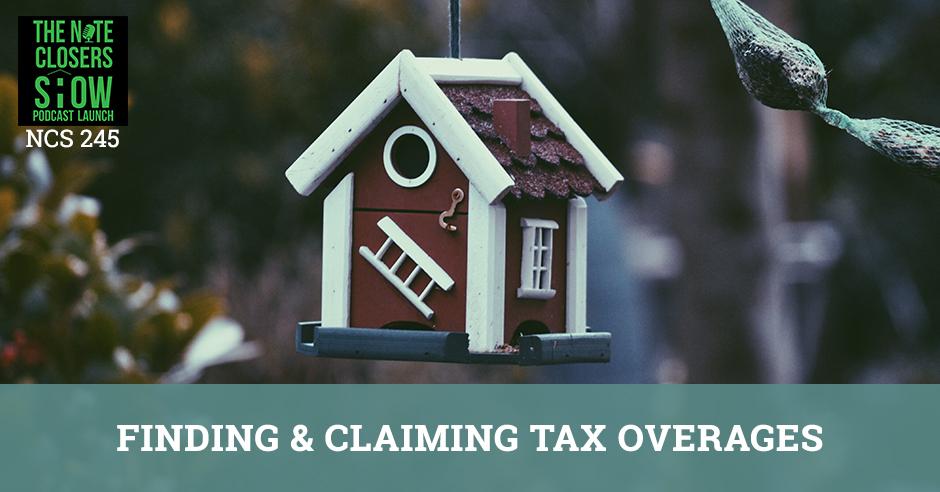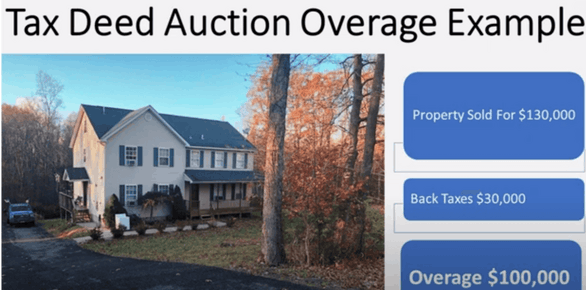All Categories
Featured
Table of Contents
Most of those homeowners didn't also understand what excess were or that they were also owed any kind of surplus funds at all. When a home owner is incapable to pay home taxes on their home, they might shed their home in what is known as a tax sale auction or a sheriff's sale.
At a tax sale public auction, residential properties are sold to the highest bidder, nevertheless, in many cases, a residential or commercial property may sell for greater than what was owed to the region, which leads to what are recognized as excess funds or tax obligation sale excess. Tax sale overages are the additional money left over when a confiscated residential or commercial property is marketed at a tax obligation sale public auction for even more than the quantity of back taxes owed on the home.
If the property costs greater than the opening bid, after that overages will be produced. Nonetheless, what most property owners do not know is that several states do not permit areas to keep this money for themselves. Some state statutes determine that excess funds can just be asserted by a couple of celebrations - including the person that owed tax obligations on the residential property at the time of the sale.
If the previous home owner owes $1,000.00 in back tax obligations, and the building costs $100,000.00 at public auction, then the legislation states that the previous homeowner is owed the difference of $99,000.00. The area does not get to keep unclaimed tax obligation overages unless the funds are still not declared after 5 years.
Trusted Tax Sale Overage List Program Tax Overages List
Nevertheless, the notice will generally be sent by mail to the address of the residential property that was sold, however since the previous homeowner no more lives at that address, they often do not obtain this notice unless their mail was being forwarded. If you are in this situation, don't allow the federal government maintain money that you are qualified to.

Every once in a while, I listen to speak about a "secret brand-new possibility" in business of (a.k.a, "excess profits," "overbids," "tax sale surpluses," and so on). If you're entirely unfamiliar with this idea, I want to provide you a fast overview of what's going on right here. When a residential or commercial property proprietor quits paying their real estate tax, the local town (i.e., the county) will await a time before they take the residential or commercial property in foreclosure and market it at their annual tax sale auction.
The information in this post can be impacted by many one-of-a-kind variables. Mean you possess a home worth $100,000.
Renowned Real Estate Overage Recovery Course Real Estate Overages

At the time of foreclosure, you owe ready to the area. A few months later, the area brings this residential or commercial property to their annual tax obligation sale. Here, they sell your residential or commercial property (in addition to loads of various other delinquent buildings) to the highest bidderall to redeem their lost tax obligation earnings on each parcel.
Most of the capitalists bidding on your residential or commercial property are completely mindful of this, also. In numerous instances, buildings like yours will receive bids Much beyond the amount of back taxes in fact owed.
Yet obtain this: the area just needed $18,000 out of this residential or commercial property. The margin between the $18,000 they required and the $40,000 they obtained is known as "excess earnings" (i.e., "tax sales excess," "overbid," "surplus," etc). Several states have statutes that forbid the area from keeping the excess settlement for these homes.
The county has rules in area where these excess profits can be claimed by their rightful owner, usually for a designated period (which differs from state to state). And who precisely is the "rightful owner" of this cash? It's YOU. That's! If you shed your home to tax obligation repossession since you owed taxesand if that residential or commercial property ultimately cost the tax obligation sale auction for over this amountyou can probably go and accumulate the difference.
Optimized Bob Diamond Overages Curriculum Real Estate Overage Funds
This includes showing you were the previous proprietor, finishing some documentation, and waiting for the funds to be delivered. For the ordinary individual who paid complete market value for their residential property, this strategy doesn't make much sense. If you have a major amount of cash money invested into a residential or commercial property, there's method way too much on the line to just "let it go" on the off-chance that you can bleed some extra cash money out of it.
For instance, with the investing technique I make use of, I might purchase residential properties totally free and clear for cents on the dollar. To the shock of some financiers, these bargains are Assuming you understand where to look, it's truthfully simple to discover them. When you can get a residential property for an unbelievably affordable price AND you recognize it deserves significantly more than you paid for it, it may extremely well make good sense for you to "roll the dice" and attempt to gather the excess profits that the tax repossession and auction procedure generate.
Acclaimed Real Estate Overage Recovery Strategy Real Estate Overage Funds
While it can certainly turn out comparable to the means I've explained it above, there are additionally a few disadvantages to the excess profits approach you really ought to understand. Tax Overages List. While it depends significantly on the attributes of the building, it is (and in many cases, most likely) that there will be no excess proceeds created at the tax obligation sale public auction
Or maybe the county does not generate much public passion in their auctions. Either method, if you're acquiring a residential property with the of letting it go to tax foreclosure so you can collect your excess earnings, what if that cash never comes through?
The very first time I sought this technique in my home state, I was informed that I didn't have the choice of declaring the excess funds that were generated from the sale of my propertybecause my state really did not enable it (County Tax Sale Overage List). In states such as this, when they produce a tax obligation sale excess at a public auction, They just maintain it! If you're thinking of utilizing this approach in your business, you'll want to believe long and difficult about where you're working and whether their laws and laws will even enable you to do it
Market-Leading Unclaimed Tax Sale Overages Course Tax Sale Overage Recovery
I did my best to provide the correct answer for each state over, but I would certainly suggest that you before continuing with the assumption that I'm 100% appropriate. Remember, I am not a lawyer or a CPA and I am not trying to offer professional lawful or tax suggestions. Speak with your attorney or certified public accountant prior to you act on this information.
Table of Contents
Latest Posts
Tax Liens And Deeds Investing
Tax Lien Deed Investing
Tax Lien Investing Scams
More
Latest Posts
Tax Liens And Deeds Investing
Tax Lien Deed Investing
Tax Lien Investing Scams